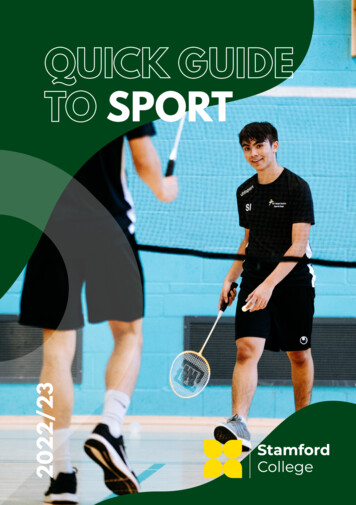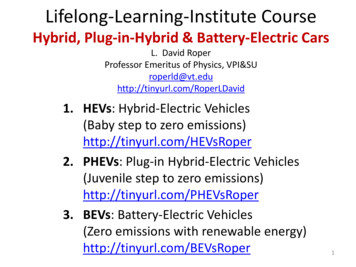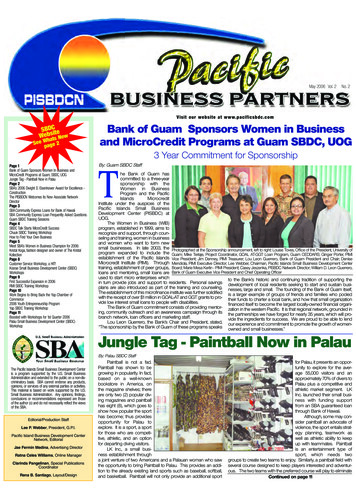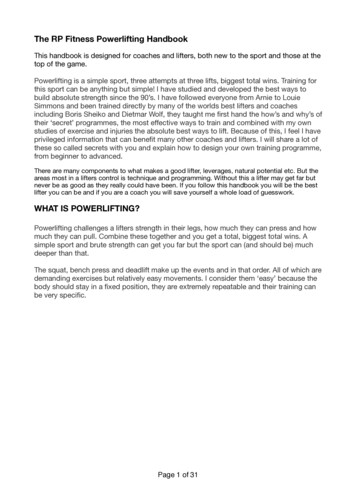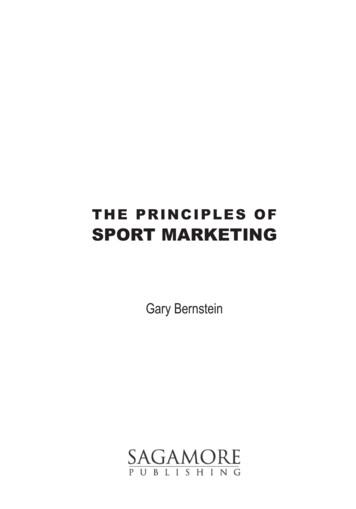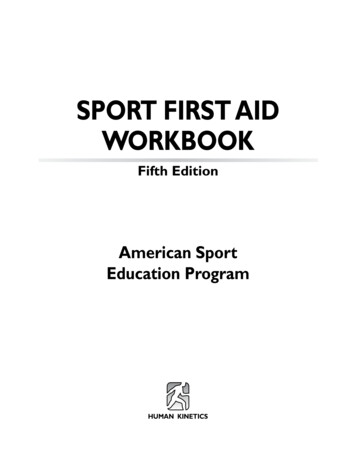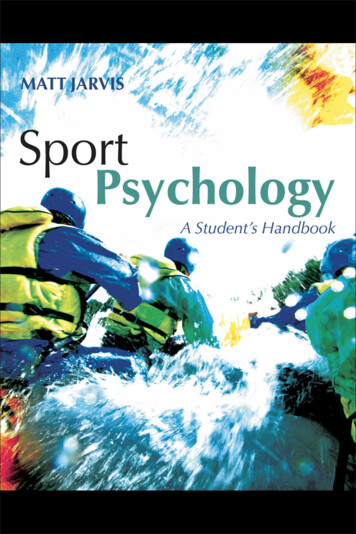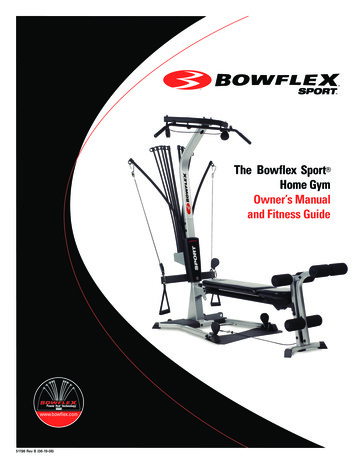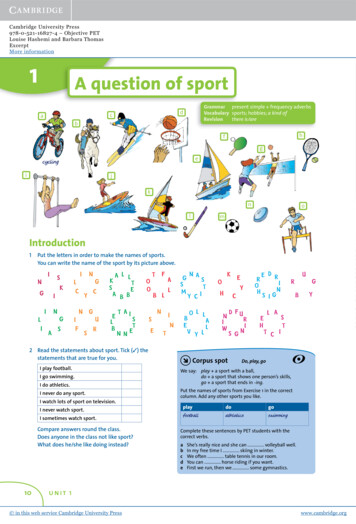
Transcription
Cambridge University Press978-0-521-16827-4 – Objective PETLouise Hashemi and Barbara ThomasExcerptMore information1A question of sportabGrammar present simple frequency adverbsVocabulary sports; hobbies; a kind ofRevisionthere is/aredchfgecyclingijknlomIntroduction1Put the letters in order to make the names of sports.You can write the name of the sport by its picture above.ISNKGNLANGCIIIILNGISFCYGUSRA L LKTSEA B BELBOOT AIN NSTEFTB LNLGSMNT2 Read the statements about sport. Tick ( ) thestatements that are true for you.I play football.I go swimming.I do athletics.I never do any sport.I watch lots of sport on television.I never watch sport.I sometimes watch sport.Compare answers round the class.Does anyone in the class not like sport?What does he/she like doing instead?10N ASTIY CO L LBAELV Y LISEAKEOYHCNIWD FUS GCorpus spotRINROHE D RS IGINURBGYL ASEHTT C IDo, play, goWe say: play a sport with a ball,do a sport that shows one person’s skills,go a sport that ends in -ing.Put the names of sports from Exercise 1 in the correctcolumn. Add any other sports you like.playdogofootballathleticsswimmingComplete these sentences by PET students with thecorrect verbs.abcdevolleyball well.She’s really nice and she canskiing in winter.In my free time Itable tennis in our room.We oftenhorse riding if you want.You cansome gymnastics.First we run, then weu n it 1 in this web service Cambridge University Presswww.cambridge.org
Cambridge University Press978-0-521-16827-4 – Objective PETLouise Hashemi and Barbara ThomasExcerptMore informationb3 Work with a partner. Look below at the names of equipment used insport. Match the equipment to the sports in Exercise 1 and write thename of the sport(s) next to the equipment. Some equipment matchesmore than one sport. Use your English–English dictionary if necessary.basket skisListening1acLook at thephotographs.They show someunusual sports –bossaball, curling,snowfering and karting.Can you guess whichsport is in each photograph?d1Listen to four people talking about these sports.Which sport is each person talking about?Write 1, 2, 3 or 4 next to each photo.3 1 03 Listen to some more information about these sports.Write the answers to these questions.202Bossaballa What do they always wear? They always wear shorts.b When do they usually play this?Curlingc What do they use?d What do people sometimes say?Kartinge How fast can you go indoors?f What is a kart?4 Listen again. The speakers say how they feelabout these sports.Which words do they use?1234Can you suggest any more words like these?Snowferingg Where do they do this?h What do they use?a q u e st i o n o f s p ort in this web service Cambridge University Press11www.cambridge.org
Cambridge University Press978-0-521-16827-4 – Objective PETLouise Hashemi and Barbara ThomasExcerptMore informationLanguage focus2 Work with a partner. Use the adverbsin the box in Exercise 1. Ask and answerquestions like these:a kind ofAnswer these questions. Use It’s a kind of and the words in the box.a What’s a helmet?It’s a kind of hat.b What’s a racket?c What’s windsurfing?d What’s table tennis?e What’s rugby?f What’s a kart?g What’s snowfering?tennishatteam gamecarwindsurfing on the snowbatsurfing on waterPresent simple frequency adverbsplay football.plays football. IHesometimes–WeShedon’tdoesn’tusuallyplay football.?DoDoesn’tyousheoftenplay football?To be frequency adverbs ayshappy.?IsAreheyouneverhappy?Grammar spotFrequency adverbsLook at the table above. Circle the correct words to complete this sentence:Frequency adverbs go before / after a main verb but before / after an auxiliaryverb and to be.1Look at the table above. Rewrite each sentence below, adding oneof the adverbs in the box in the correct place. Do other peopleagree with your answers?never sometimes often usually alwaysa Basketball players are tall.Basketball players are often tall.b Cyclists go very fast.c Footballers are very rich.d Surfers get wet.e Gymnasts wear helmets.f There are two people in a tennis match.g Good athletes smoke.12Do you often finish your homework?Yes, always!Does your dad sometimes play tennis?Yes, often.Are you always tidy?No, never!Use these words, or your own ideas:make breakfastplay computer gamesbe politewear expensive clothesremember your friend’s birthdayCorpus spotWord orderCorrect the word order mistakes in thesesentences by PET students.a She comes often to my house.b I meet them sometimes in my free time.c At weddings people usually are happy andhave fun together.d I don’t go often to the countryside.e He usually doesn’t make jokes.f We have a basketball team and we playoften against other teams.3 Complete these sentences aboutyourself and your family and friends.Use the frequency adverbs in the box inExercise 1. Use not in some sentences.a I don’t often eat cheese forbreakfast.b My brother usually plays footballafter class.cvery tired in the morning.da sleep in the afternoon.ein the spring.fquiet in English lessons.gsport on television.4 Now write three true sentences usingthe frequency adverbs with your ownideas.GF page 206u n it 1 in this web service Cambridge University Presswww.cambridge.org
«Pronunciation»Word trees are a useful way tolearn and remember word families.Make a vocabulary tree of wordsfor a sport or activity that youenjoy./i /steephill104 Listen to the recording andcheck your answers.4 Write four ways we can spell thesound /i / in i /quitelketsbooamtesteep quite hill field likeknee kind people ice littlestick line big street riderich wheel bike team/ai/goairt2 Say these words aloud and putthem into the correct column.Vocabulary spotincaptaThink about the words like and big.Do they have the same vowel soundas wheel and please?sh1shortsCambridge University Press978-0-521-16827-4 – Objective PETLouise Hashemi and Barbara ThomasExcerptMore informationfootball«Activity» Make a posterMake a poster about a sportsman or sportswoman you admire. Put theirpicture on it if you can. Write this kind of information on it:What sport does he/she play?What does he/she usually wear?What equipment does he/she use?What does he/she often/sometimes/never do?How do you feel about this sport?«Activity» Free time1Work with a partner. Choose a sportor hobby (it’s better if it’s unusual!).Write down some informationabout it. Write sentences like these:You play in a team. / You cando this alone.You play in a field. / You usuallydo this in a swimming pool.2 Now talk to another pair ofstudents. Don’t tell them the nameof your sport or hobby. Try to guesstheir sport or hobby and let themtry to guess yours. Ask questionslike these:Do you usually do this in summer?Do you use a kind of board?Do you always play with friends?Do you wear special shoes?How many people are there in theteam?Is it sometimes dangerous?You can answer:Yes, (sometimes / usually / often /always) or No, (never) or We don’tknow.a q u e st i o n o f s p ort in this web service Cambridge University Press13www.cambridge.org
Cambridge University Press978-0-521-16827-4 – Objective PETLouise Hashemi and Barbara ThomasExcerptMore informationExam folder 13It’s too cold for footballpractice tonightbut come to the gymfor fitness trainingM.CollinsReading Part 11Look at these texts. Before you read them,say which is: a text messagean emaila Post-it note a telephone messagea notice.41This sports camp is great but the changingroom is small and dirty. Also, the café is alwayscrowded, so my friends and I eat in the park.MariaJamiePhone message from Kara. She’sgoing swimming tonight and sayswould you like to go with her? Phoneher before 7 please. Dad52The swimming poolopens at 6.30amexcept Sundayswhen it opens at 7amPaoloHere’s the informationabout the sports centre.I always go on Tuesday evenings.Ring me if you can come with menext Tuesday.Marco2 Now read the texts. Were you right?Exam AdviceLook at the texts and decide what they are, e.g. a Post-itnote, an email, etc. It will help you to answer the questions.3 Read text 1 again. Look at these three sentencesabout it. Which one says the same as the email?A Maria meets her friends in the café.B Maria eats outdoors.C Maria likes the changing room.B is correct. Underline the words in text 1 which tellyou about where she eats.Why are A and C wrong? Underline the words intext 1 which tell you about Maria’s friends and thechanging room.144 Now choose the correct answers for the other texts.2 A The swimming pool opens at 6.30 every day.B The swimming pool opens at 7 on Sundays.C The swimming pool opens early at weekends.3 A Football practice is cancelled tonight.B There isn’t time for fitness training tonight.C The footballers can’t meet tonight.4 A Dad wants Jamie to phone him.B Kara wants to meet Jamie at 7.C Kara wants to go swimming with Jamie.5 A Marco goes to the sports centre every week.B Paolo and Marco often go to the sportscentre together.C Paolo sometimes goes to the sports centreon Tuesdays.exam f o l d er 1 in this web service Cambridge University Presswww.cambridge.org
Cambridge University Press978-0-521-16827-4 – Objective PETLouise Hashemi and Barbara ThomasExcerptMore informationSpeaking Part 11Make some questions to ask Pablo and Cristina. Use these words.What / your surname?Where / live?How / old?How / travel to school?Where / come from?What part of / live in?How many languages / speak?What / like doing in your free time?me?2 Read these texts and find the answers to your questions.My name is Pablo. My surname’s Suarez.I’m Spanish. I live in a village near a large citycalled Seville. It’s in the south of Spain.I usually drive to college. I’m 19 years old.I speak Spanish and English. I like playingfootball and going to the cinema.My name is Cristina Lopez. I’mMexican. I live in the centre of thecapital, Mexico City. I usually walkto school. I’m 16 years old. I speakSpanish, English and a little Italian.In my free time, I like shopping, readingand going out with friends.3 Work with a partner. One of you is Pablo and the other is Cristina.Ask and answer the questions in Exercise 1.4 Think of the answers you can give about yourself to the questionsin Exercise 1.Exam AdviceThe examiner asks you questions aboutyourself. Learn how to talk about yourself,where you live and what you like doing.5 Now ask your partner the same questions. Your partner answersabout himself or herself. Then your partner asks you. Answer aboutyourself.6 Write a text about yourself, like the texts by Pablo and Cristina. Useyour answers to the questions to help you.e x am f o ld er 1 in this web service Cambridge University Press15www.cambridge.org
1 Put the letters in order to make the names of sports. You can write the name of the sport by its picture above. Corpus spot Do, play, go We say: play a sport with a ball, do a sport that shows one person’s skills, go a sport that ends in -ing. Put the names of sports from Exercise 1 in the correc



